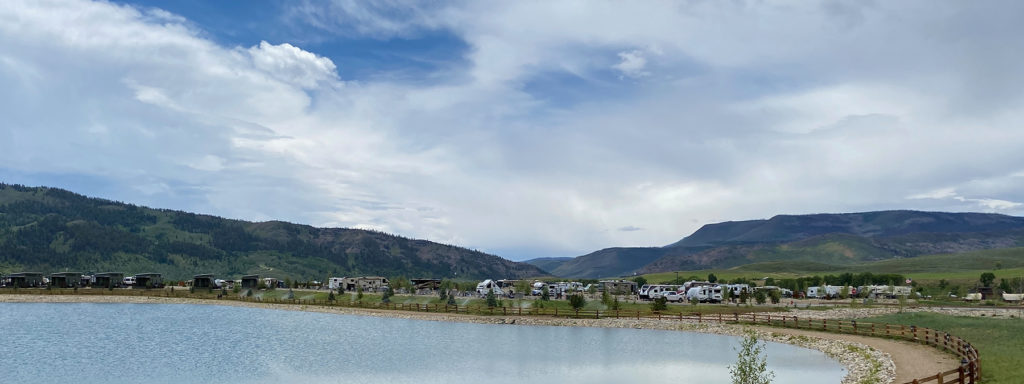How To Estimate The Worth Of Your RV
The information provided in this article is to provide general information on resources available that can be used to assist in valuing used RVs. Actual used values may vary and nothing in this article shall guarantee a particular value for your used RV.
HOW TO ESTIMATE THE WORTH OF YOUR RV
Heartland RVs are carefully built to last for many, many years with proper maintenance and care. But there are times when you might decide to trade in your RV well before that. For example, you might need a bigger RV to fit your growing family. Or want a smaller RV as you downsize to a simpler lifestyle. You may have your eye on a model with innovative new amenities and just want the newest bells and whistles.
Whatever your reason for selling your RV, your first question is probably, “How do I know what my RV is worth?” Unlike automobiles, there’s no Kelley Blue Book for travel trailers, motorhomes, and other recreational vehicles. But instead of using Kelley Blue Book, campers can access a few tools that come close. Here are some ways on how to estimate the worth of your RV – but to know for sure, your best bet is to visit your local Heartland dealer. Heartland does not provide trade in values for any of our models.
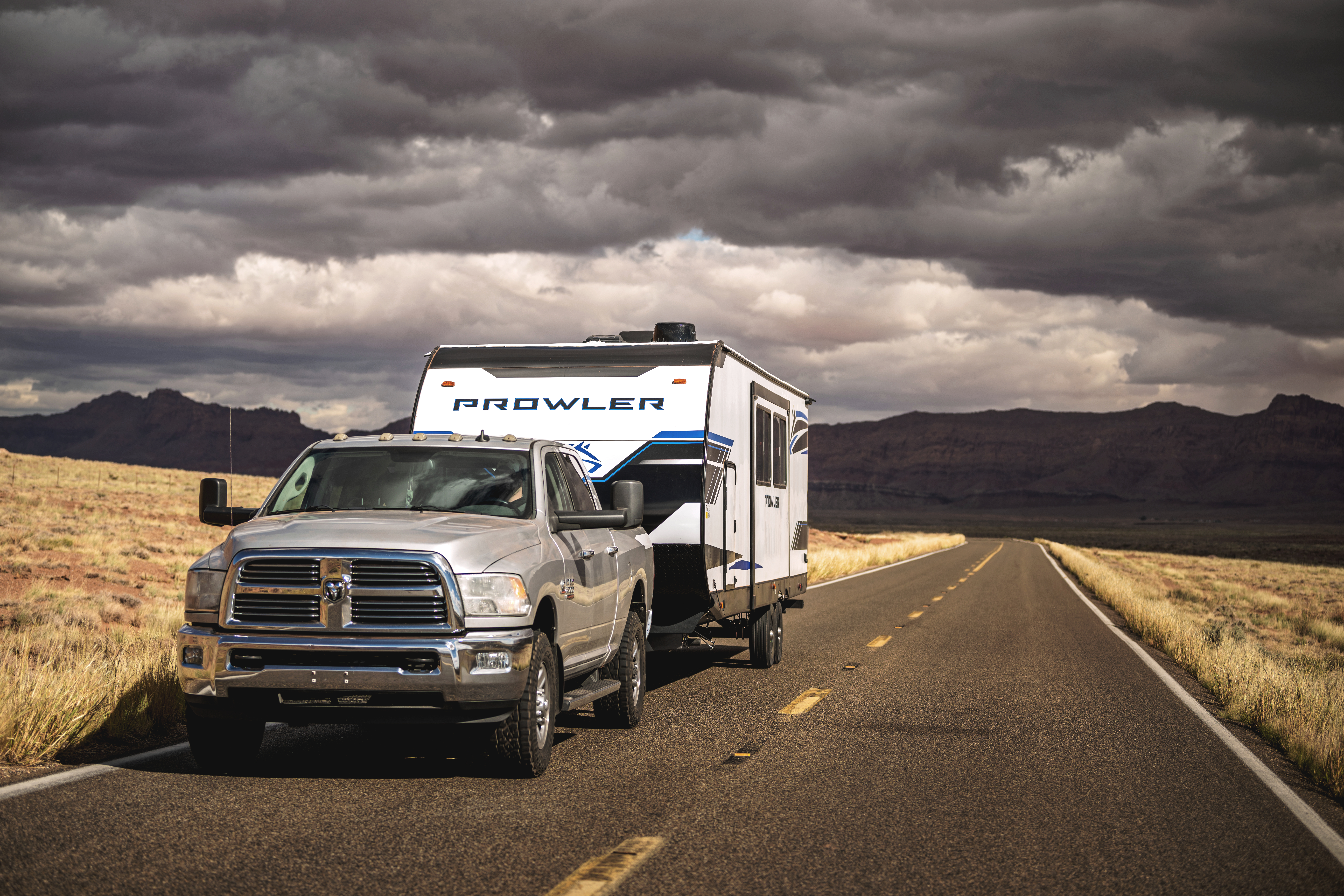
FACTORS THAT DETERMINE THE WORTH OF YOUR RV
Like selling anything else, there are a number of variables that go into determining how much someone might pay for your RV. Having a clear understanding of where your RV falls in the factors below will help you sell your RV faster and more easily. Jot down a few notes about your RV as we go through each section, and then we’ll point you toward online tools that can use that data to give you an estimate.
MAKE, MODEL AND AGE
Just like automobiles, the make, model and age of your RV will be three of the biggest factors that go into its current value. Obviously, if you have a newer model or floor plan from a major RV manufacturer that’s just a few years old, your RV will retain its worth better than a 15-year-old model from a defunct manufacturer.
You'll want to look up answers to the following questions before we move onto pricing your RV:
- How old is your RV?
- What's the name of the make of your RV? Who manufacturers your RV?
- Is this manufacturer still producing RVs today?
- Is there anything specific about your model that might be particularly desirable? I.e. a rare feature that other RVs don't have, or a well-laid-out floor plan that's no longer manufactured?
RV SIZE
The size of your RV will also help determine what it’s worth, with larger RVs like fifth wheels and toy haulers commanding higher prices. But even if you don’t have a particularly large RV, make a note of your RVs dimensions. Buyers may be looking for exactly what you’re selling. Write down the following:
- How long is your RV?
- How tall is it? What's the clearance?
- What is the dry weight of the RV?
- How much square footage is there in the interior?
- If it's a toy hauler, how big is the garage?
- How many bedrooms are there?
- How many bathrooms are there?
OVERALL CONDITION
Going hand in hand with mileage, the overall condition of your coach will play a big part in calculating how much your RV is worth. This includes the condition of everything in the interior of your RV, all the exterior and construction elements, etc. Here are some things to look for:
- How does your RV perform compared to when it was new? Do all the components work as they should?
- How does your RV look on the inside and outside? Are there any dings to the paint or finishes? Scratches? Stains?
- Is there anything in or on your RV that needs to be repaired?
- Have you made any repairs or upgrades to your RV over the years that a buyer would be happy to see? For example, giving the inside a fresh coat of paint, adding a second TV, or upgrading to a more powerful air conditioner.
- What’s the condition of your RV’s engine (if applicable)? When is the last time you had it checked and serviced? How frequently do you take it in for maintenance checks?
FEATURES
Now we’re getting into the fun stuff – the features of your RV. With a wide variety of RVs on the market, the features in your RV can set it apart from the rest. Not everyone is looking for the newest and most elaborate RV set up. Some people know exactly which features they want and what they don’t need, so no matter what the features of your RV are, there’s someone looking for what you have. Here are some things to consider:
- What were the features of your RV that were major selling points when you bought it? For example, was there some kind of new technology your RV had that others didn’t? Does your RV have a particularly large or fancy kitchen, bathroom or bedroom suite? Does it come with washer/dryer prep, or any other features that are less common?
- Which features did you find the most useful, or use the most when you were camping? For example, does your RV have an outdoor kitchen you used on every trip? Was there a particular storage area that came in really handy? Did you have push-button leveling that made set-up and tear-down a snap?
- Are there features your RV has that most other RVs don’t? What are they?
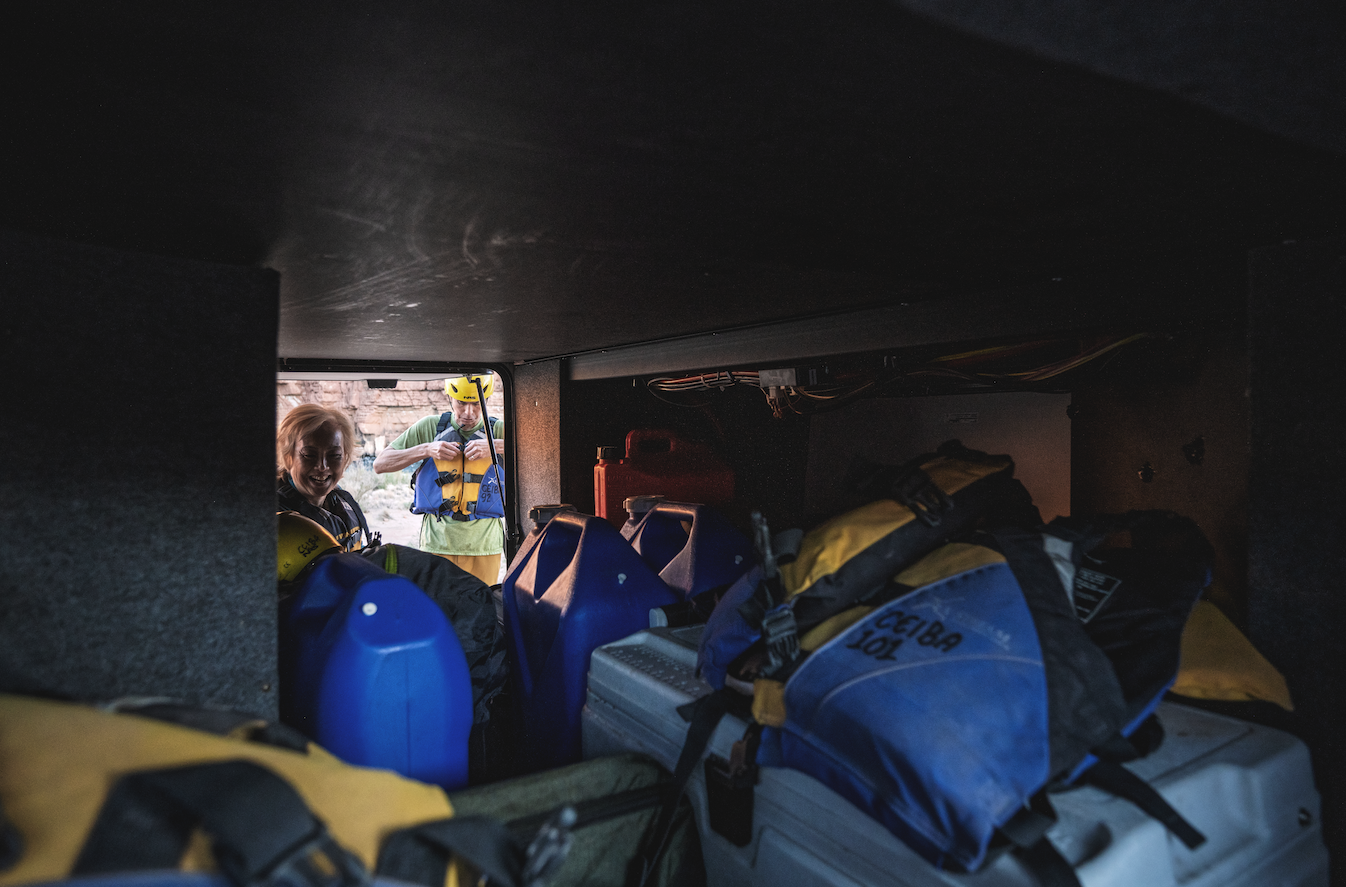
ADDITIONAL FEATURES
- What kind of appliances does your RV have?
- How many beds are there? How big are they?
- How big are the tanks on your RV?
- What is the layout like on your RV? Are there particular benefits to that layout, like a bunkhouse perfect for sleeping multiple kids, or a slide that expands the master bedroom when you’re parked?
- If you have a toy hauler, what’s included in the garage? Are there professionally installed tie downs? A motorized bed loft that can raise or lower? A patio kit that comes included? Does your toy hauler have an onboard fuel station?
- What other features can you think of that a buyer might want to see? (Even if you didn’t use them much yourself.)
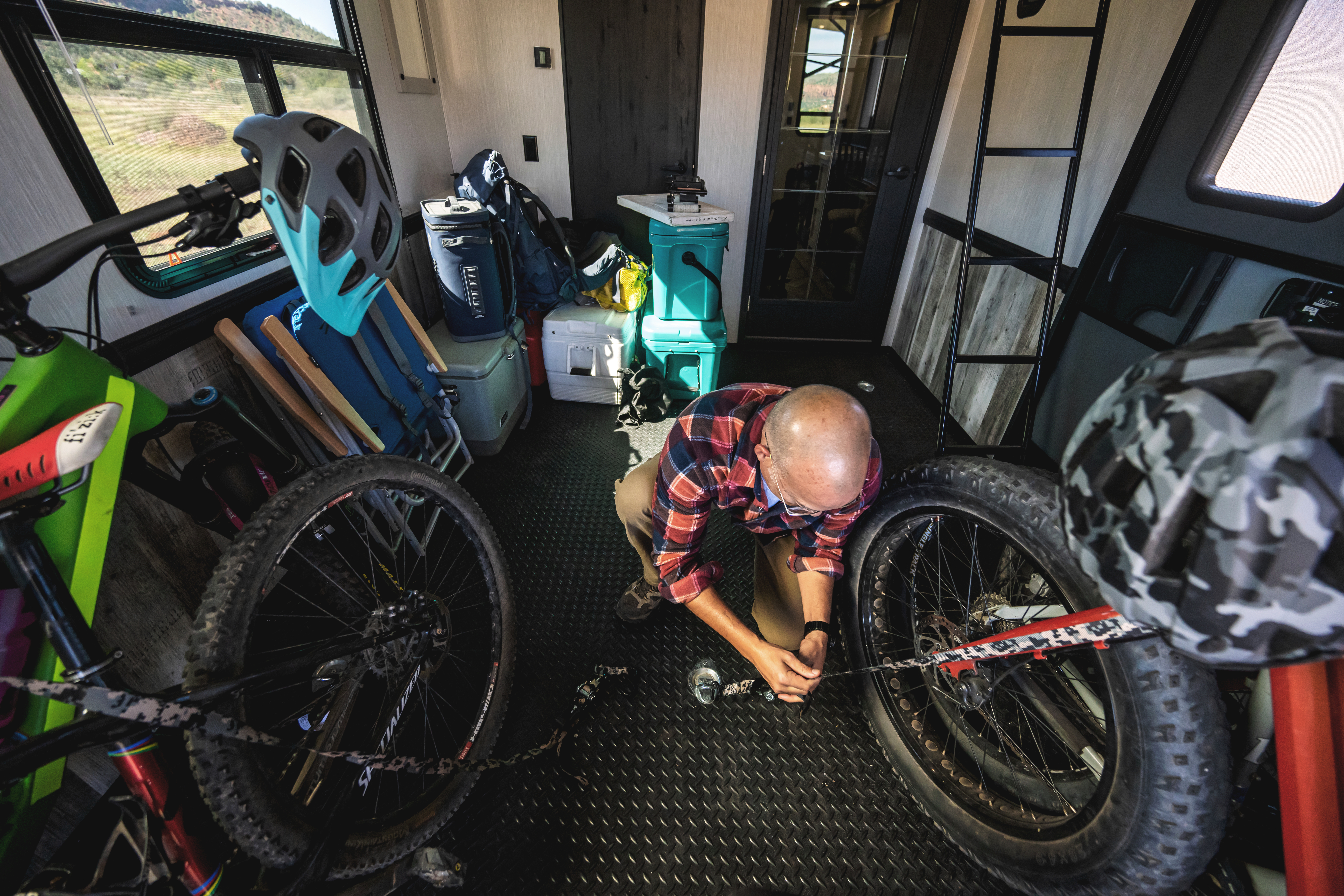
MARKET AND SEASON
Like selling a house, selling an RV for a good price can hinge on market demand and even the season when you’re trying to sell it. If RVing is extremely popular where you live, but there are few RVs available to buy, your RV will have a higher value than if you live in an area where few people RV but there are tons available to buy. Or it may be that there are lots of RVs on the market, but none of your make and model, which might make it more desirable.
The season can also affect your RV’s worth. In many areas of the U.S., RVing is an activity done primarily in the spring, summer and fall. In other words, the warmer months in climates with more dramatic temperature shifts from season to season. If you live in a more temperate climate like California or Florida, where winters are mild and warm, the season you sell your RV may not matter as much. But if you’re trying to sell an RV in Maine, with snow on the ground for several months a year, you’ll probably have better luck offloading it closer to summer.
FACTORS TO CONSIDER:
- How many RVs are available in your geographic region? Does this number fluctuate, month by month?
- When are people in your area more likely to use an RV?
- How many RVs of a similar make and model are currently available near you?
- Is your RV a highly sought after brand or model, in general or in your region?
TOOLS FOR EVALUATING THE VALUE OF YOUR RV
While there’s no Kelley Blue Book for RVs, there are a number of sites and services that offer similar data. So now that you’ve collected this wealth of information about your RV and the market, let’s walk through how to estimate the value of your RV.
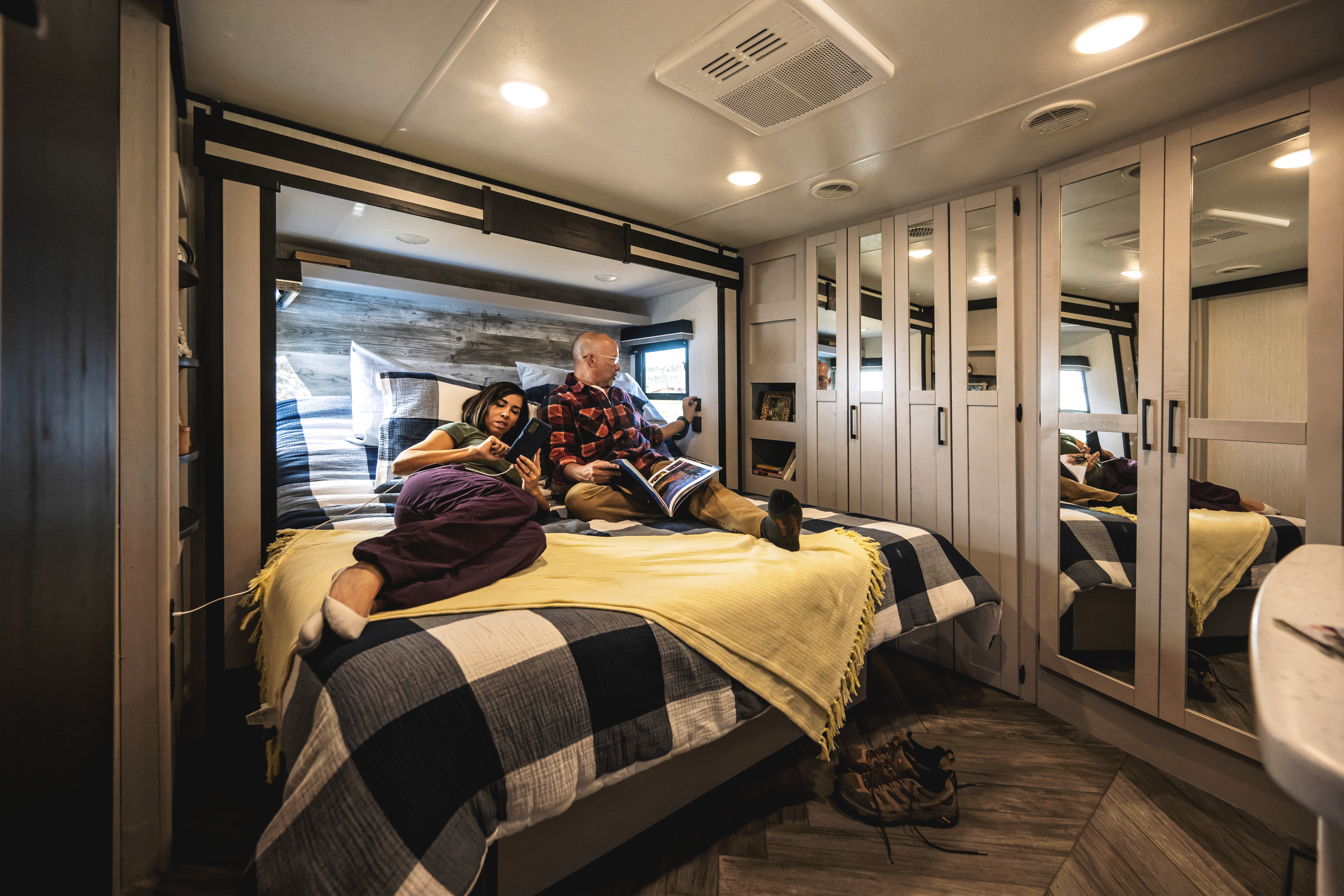
NATIONAL AUTOMOBILE DEALER'S ASSOCIATION (NADA)
Through the NADA website (part of J.D. Power), there’s a wealth of information about RV prices and market value. NADA guides offers a catalog you can search to find prices for all kinds of RVs - from motorhomes to trailers to fifth wheels and more. They’ve compiled information about RV models from thousands of manufacturers going back several years.
To access the RV price guide, first, select an RV category. Then choose the manufacturer of your RV, then the year and make. The site will walk you through a series of features with the option to check off the ones you have. Then it will give you the suggested retail price, the low retail price and the average retail price for the RV that matches the data you entered in your given ZIP code. This will give you a good idea of the range of prices people near will pay for your RV’s unique mix of features. That way, you can decide when to sell, when to hold out for a better deal, and when to wait until a more hospitable season to offload your well-loved RV.
RV TRADER PRICE CHECKER
RV Trader offers a similar RV price guide to NADA guides – the RV Trader Price Checker. You just enter your location (or you can search nationwide), the type of RV you have, the make, model and trim level, and the year it was manufactured. Then it will tell you the highest, lowest and average prices for RVs that match the one you’re selling.
RV Trader also offers a service where owners can list their used RV for sale on the site. For a one-time fee, choose from three tiers of options that allow users to upload up to 50 photos, a YouTube video, and list an RV for sale for up to one year. If you’re hoping to sell your RV yourself, rather than trading it into a dealer, check out their listing program. It could save you a ton of time, since it’s a well-trafficked site RV enthusiasts know and trust.
SELLING YOUR RV
Once you have a comprehensive picture of what your RV may be worth, now is the time to choose how to sell it. Taking it to a dealership and trading it in for a newer model is one way. It’s quick, simple, and the dealership does most of the legwork.
But some people prefer to sell their RV privately to a buyer – meaning that the sale is between you and another person, rather than having a middleman involved. The pros of this are that you can typically sell the RV for a bit more than a dealer would offer. If a buyer lowballs you, you can wait for another one to come along, and control the way your RV is represented in the listing. The cons are that you’ll need to do all the legwork, from taking pictures to uploading a listing, responding to prospective buyers, and ensuring that a buyer’s payment clears when ownership is handed off.
NEXT BIG ADVENTURE
No matter what is decided, we hope our guide to pricing the value of your RV has been useful. An RV can be a major investment for most people, but with a little research and tips on how to price your coach, you’ll set yourself up to sell your RV easily and move onto your next big adventure.

The information provided in this article is to provide general information on resources available that can be used to assist in valuing used RVs. Actual used values may vary and nothing in this article shall guarantee a particular value for your used RV.



